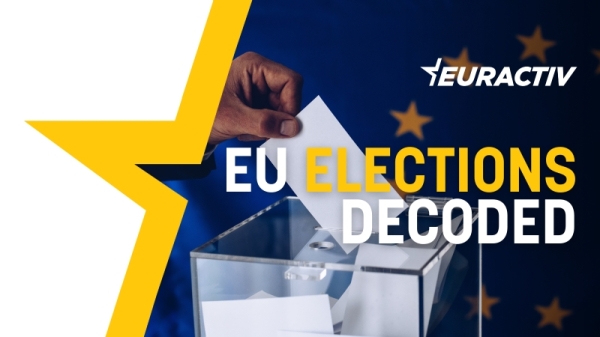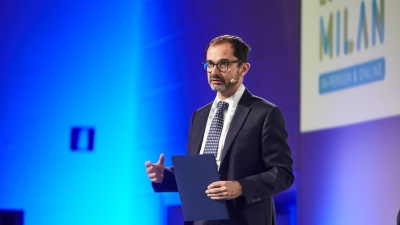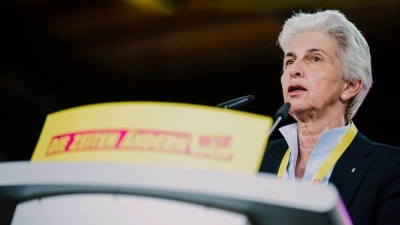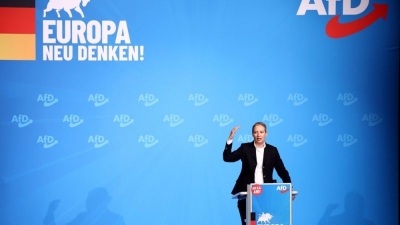Are EU liberals still progressive and pro-European?

Welcome to EU Elections Decoded, your essential guide for staying up to date and receiving exclusive insights about the upcoming EU elections. Subscribe here.
In today’s edition
- Are European liberals still progressive and pro-European?
- Being supported by a political party does not mean representing it
- Wilders’ fate might anticipate post-EU election discussions
One of the leaders of the liberals in the EU election campaign will be German defence expert Marie-Agnes Strack-Zimmermann, whose party in Germany has been obstructing significant legislative proposals related to business and the Green Deal in recent weeks.
The somewhat unusual choice puts into question the liberals’ overall strategy and future politics, at a time when polls project a weaker showing for the liberal centrists in June’s EU elections.
ALDE – the largest political family in the liberal Renew Group in the European Parliament – picked the German defence policy expert to represent them in the campaign, alongside two other liberal figures.
In recent weeks, Strack-Zimmermann’s party in Berlin, the pro-business Free Democratic Party (FDP), has been at the forefront of obstructing legislative proposals related to business and the Green Deal, such as the EU Corporate Sustainability Due Diligence Directive (ECSDDD), the Platform Workers Directive, and the Nature Restoration law.
More concretely, the German media outlet Handelsblatt wrote last month that the FDP has the intention to block almost 14 legislative EU files before the end of the mandate.
Why does a party holding merely 3-5% of public support in Germany wield such considerable influence? The reason lies in its role as a minority party within the German government coalition, which operates under a rule that mandates unanimity for any kind of decision on EU policies.
German liberals’ behaviour appears to have been prized by the European family ALDE, in giving it an EU leading candidate, denying the family’s more federalist and progressive nature (supporting files endorsed by the European Parliament majority, for instance) that is traditionally at the core of the liberals.
Perhaps it was due to major leadership problems that all parties are experiencing, or it was a way to give more space to more prominent political figures in the liberal group, such as the Estonian Prime Minister Kaja Kallas, who had proposed herself as the lead candidate, before stepping back.
This issue opens a major question about what it means to be a pro-European leader: French and German governments have always been perceived as pro-European countries, in contrast to Eastern countries or the “enemy of the enemies”, Hungarian Prime Minister Viktor Orban.
But can leaders blocking EU legislation to defend national and electoral interests be defined as pro-European and progressive? And will it work to charm voters in June?
We have a leadership problem among EU parties. What is the difference between being supported and representing? This is what we’re seeing with Europe’s centre-right (European People’s Party) and centre-left (the socialists and democrats).
Both leading candidates of these political families, Ursula von der Leyen and Nicolas Schmit, are ‘supported’ by their party, but do not represent them. In practical terms, it means that neither of them run in the elections (for a seat in the European Parliament) and neither have been really involved in their party politics in the last five years.
The choice of supporting without representing probably creates confusion among the electorate, and, maybe, a lack of trust towards top-down approaches.
Wilders’ fate might anticipate post-EU election discussions. Geert Wilders, the Dutch far-right leader and winner of the Dutch elections, announced on Wednesday (13 March) that he will not take the prime minister’s post as he is unable to form a right-wing coalition.
His political conundrum previews one of the debates the European Parliament will face after the EU elections: which majority will take the lead in shaping EU policies?
Here are the two most likely scenarios: a right-wing coalition (i.e. what Wilders tried in the Netherlands), as Nicola Procaccini, the co-president of the nationalist ECR group told Euractiv, or the continuing domination of the two main centrist parties: the centre-right EPP and the socialists, supported by other minority parties.
Flash updates
Sliver of hope for unity in French left collapses over war in Ukraine. Whatever hope remained that a coalition of the French left parties may find common ground ahead of June’s EU elections has collapsed over the radically different approaches to handling and resolving the war in Ukraine.
Disinformation campaigns likely to undermine EU elections, experts say. Attempts to undermine the legitimacy of the upcoming June EU elections and discourage the public from voting are expected “to be very much prevalent”, the European Parliament and experts have warned.
EU elections polls: French far-right exceeds 30%, widens gap with Macron’s liberal Renaissance. France’s far-right Rassemblement National (RN) surpassed 30% in the latest polls for the European elections, moving further away from its main rival – President Emmanuel Macron’s fading Renaissance party – while its far-right rival Reconquête! slipped and the Socialists clawed back some ground.
If you’d like to contact us for tips, comments, and/or feedback, drop me a line at This email address is being protected from spambots. You need JavaScript enabled to view it.
[Edited by Aurélie Pugnet/Zoran Radosavljevic]
Read more with Euractiv




